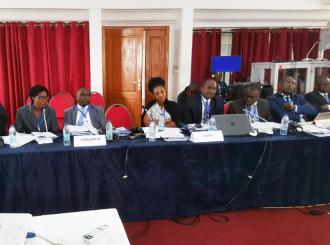
Yaounde, 15 January 2020 (ECA) – Work on the establishment of a harmonized customs union between CEMAC and ECCAS in order to consolidate subregional free trade in Central Africa and better harness the advantages of the African Continental Free Trade Area (AfCFTA), has reached an advance state.
About 40 experts comprising senior customs officials, representatives of trade ministries, delegates from the eleven countries of central Africa and senior officials of the Steering Committee for the Rationalisation of Regional Economic Communities in Central Africa (COPIL) met in Douala, Cameroon, at the behest of the Subregional Office for Central Africa of the UN Economic Commission for Africa (ECA), the CEMAC Commission and the ECCAS General Secretariat from 6 to 10 January 2020 to finalize four reports on this endeavour.
The studies cover: (i) unrestricted trade within a unified free trade area for Central Africa straddling ECCAS and CEMAC (ii) the codification of customs procedures, (iii) the impact of the AfCFTA on Central Africa’s economies, and (iv) progressive trade measures in the subregion.
According to Simon Fouda, economic Affairs Officer at ECA, who represented the Commission at the review exercise, the end result would be to deepen the economic and trade integration process in Central Africa.
“The Roadmap of the African Union provided for the establishment of free trade zones in all the sub-regions of the continent by 2014. That of the ECCAS was created on 27 January 2004 but, it is clear that it is still not operational for many reasons,” especially due to the challenge of streamlining divergent trade and integration policies, programs and instruments between CEMAC and ECCAS, he explained.
In the case of the CEMAC zone, it was noted that free trade and customs arrangements are pretty much advanced in comparison to the wider ECCAS grouping (to which all six CEMAC member States also belong). Streamlined intra-CEMAC policies, programs and instruments partly explain why the area collectively recorded a balance of trade surplus of 3.4 billion CFA francs in 2018, a marked improvement from the previous years, according to Ms. Juliette Engoue who represented the CEMAC Commission at the Douala workshop.
She however noted four challenges to a more profitable external trade for the CEMAC zone, notably: the low level of diversification of exports in goods, the high level of food imports, the low level of intra-community trade (2% in 2018), and structural weakness of trade in services.
The trade experts concurred that in spite of these challenges, CEMAC has got its act together and what remains is total realignment with the larger ECCAS community.
This is why ECA is working in concert with both the ECCAS General Secretariat and the CEMAC Commission to harmonize trade instruments necessary to arrive at a single customs union and subregional common market, with financial support from the European Union.
So far, much ground has been covered in establishing a common external tariff (CET) for ECCAS and CEMAC, as recalled by ECCAS Trade and Free Movement expert, Jacob Kotcho, during the meeting.
Completed actions include: a tariff structure ledger with the classification of products and their related customs duties, a document on the impact of the harmonized CET project (to be updated), a harmonized customs code, the operationalization of unrestricted circulation of tradable items and re-exportation regimes, the codification of customs procedures, a common trade policy for Central Africa, and trade defense measures (including anti-dumping, compensation and safeguarding mechanisms).
What remains, he said, is to finalize negotiations for unique customs duties and associated rules to be applied across ECCAS and CEMAC.
In his explication, beyond customs duties, elements such as value added tax and national regimes with disparate incentives to be found in investment codes, mining codes, hydrocarbons codes and the statutes of NGOs, also come into play. He said even the instruments for financing activities of subregional integration in Central Africa would have to be streamlined as ECCAS collects a community contribution for integration (CCI, in French) while CEMAC collects a community integration tax (TCI, in French).
The reviewed studies from the Douala meeting will be channelled to ECCAS and CEMAC statutory bodies, under the banner of Heads of State and Government of the subregion.
-END-
Media Contact
Abel Akara Ticha - Communication Officer
United Nations Economic Commission for Africa
637, rue 3.069, Quartier du Lac, Yaounde, Cameroon
Tel: +237 222504348
E-mail: akara@un.org